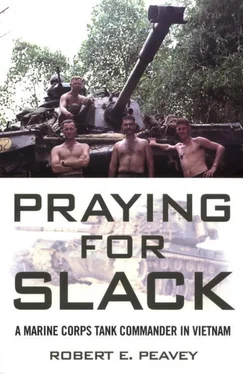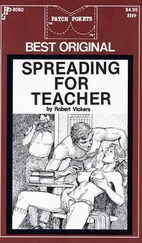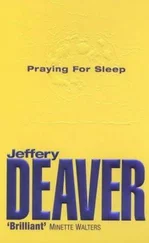“Damn!” our guest exclaimed. “Y’all got everythin’. I wish I was a tank man.” He glanced at his watch.
I had all I could do to keep a straight face. “We don’t want to waste our batteries. Tell me when it’s exactly 7 p.m.”
A minute later he said, “It’s time!”
“Okay!” I reached for the switch that turned on the searchlight from the TC’s position. Suddenly, Bonanza and every other TV show he had ever seen hit him right between the eyes with 75-million candlepower. He flung up his hands, lost his balance, and fell off the back of the tank.
All four of us were in hysterics at the victim’s unusual exit. We walked over to the back of the tank. “You okay?” we asked. He was holding his hands over his eyes, moaning that he couldn’t see.
That night, the country boy’s lieutenant and corpsman came over to give Hearn and me one hell of an ass-chewing: “If that man’s sight isn’t back by tomorrow, you’re up for a court martial!” the LT told me.
Our victim had gone blind? The corpsman hoped it would be only temporary.
Happily, the next day proved him right. But meanwhile, I spent a long night worried that I had permanently damaged someone’s eyes. But still, how dumb can you be?
WE DECIDED TO GIVE our tank a name. The crew got together and spent several weeks mulling over possibilities. I was hoping for something humorous and different, having seen too many tanks named after some tank commander’s girlfriend back in The World. We threw out name after name until we finally settled on one I’d proposed.
At the time, Dow Chemical Company used an advertising slogan, “Better Living Through Chemistry.” I suggested changing the last word to “Canister,” the type of antipersonnel ammunition we used most often.
Canister was the tank’s equivalent of a giant shotgun shell, a nasty and very effective projectile against “soft targets,” the military’s term for people. Immediately upon leaving the gun tube, a wall of 1,200 half-inch-long, quarter-inch chopped-steel rods would spread out and remained extremely effective for up to 300 meters. Our tank would be forever known as Better Living Thru Canister , and I was given the task of painting the name on the gun tube.
None of us could have ever imagined just how prophetic a name it would become. In just a few short weeks, a canister-like round fired at us by another tank would save our lives.
During late afternoons we tried to sleep, but usually wound up sitting around listening to AFVN radio. The only English-speaking station in the whole country, it started each day with “G-o-o-o-o-d Morning, Vietnam!” later made famous by the Robin Williams movie of the same name. Other than mail from home, it was our only link back to The World and the sanity we had left behind.
Upon arrival, I was totally surprised to find out that we had our own radio station in-country. I still remember a few radio personalities like Chris Noel, whose voice I fell in love with. I wrote to her, and to my delighted amazement she responded, enclosing a couple of photos to prove she really was the fox she sounded like. I also wrote to Vicki Lawrence, an unknown at the time who did some radio work; she too wrote me back and sent her picture too.
Certain songs, when played today, immediately take me back to the Cao Do or Ha Dong bridges, where we sat around, bored out of our minds. The Animals had the greatest song of the war, the perfect sing-along for anyone near a radio. Everybody joined in, as loud as they could, on the refrain: “We got to get out of this place, if it’s the last thing we e-v-e-r do!” God, how we loved that song! Half a mile outside any American fire base, you knew whenever it came on the radio because you could hear everyone belting it out.
Bobby Goldsboro’s “Honey” always reminded me of my fiancee, Michele, a lab technician back in The World on Long Island. Among my favorites were the Mommas and the Papas’ “This Is Dedicated to the One I Love,” along with Otis Redding’s “Sittin’ On the Dock of the Bay,” and the Turtles’ “So Happy Together.” During late 1968 and early 1969, we turned up anything by the Doors.
Two or three times a week, we slipped down the muddy banks to bathe in whatever river flowed under whichever bridge we were guarding. Refreshing as the water was, I always felt uncomfortable doing this. Even with my clothes on, I felt naked; I didn’t like being away from my flak jacket and steel helmet. Moreover, I didn’t like being away from the tank. I washed quickly and got out while others fooled around, grab-assing and having water fights as if they were back in The World. Heck, I had seen how the Vietnamese fertilized their crops! Who knew what was floating in that water? And why would I want to swim in it?
WE OFTEN PROVIDED SECURITY for the morning’s road-sweep team. That meant travel—from the bridge we were protecting to the next bridge or fire base down the road, or until we were met by another sweep team coming in the opposite direction. Our tank moved at a deathly slow pace, behind a grunt on foot who was fanning a mine detector from side to side. When it came to planting mines with prodigious ability, Charlie was a regular Johnny Appleseed. During one such routine, in April, our boredom was punctuated with raw adrenaline.
Our tank was following fifty feet behind two minesweepers and a squad of grunts spread out behind them. Another fifty feet behind us trailed a second tank, and behind that were several trucks loaded with armed men crouched down behind the trucks’ low metal sides.
To avoid running over an undiscovered mine, you always kept your vehicle in the tracks left by the vehicle directly ahead. Because mine detectors were nothing but glorified metal detectors, it was easy for them to miss the homemade mines encased in wood that Charlie planted. So even if a road had been swept, drivers adhered to the tracks of the vehicle in front. But any truck following a tank was faced with a dilemma. Because tanks were so much wider than trucks, a truck driver could keep only one pair of his wheels in the tank’s tracks. That meant the left side of a truck would stay in the tank’s tracks because no truck driver was going to risk running over a mine on his side of the vehicle.
One April morning, our tank was nearing the halfway point of our road-sweep when a truck behind us was lifted off the ground by a large explosion.
I was sitting in the gunner’s seat; I could feel the concussion through the tank’s hull. “What the fuck was that?” I asked over the intercom. My answer came, not from my tank commander, but from dozens of Chicom AK-47 rifles.
I had the main gun trained on a tree line on the right side of the road when I saw Christmas lights twinkling throughout the undergrowth. Seconds later, enemy mortars began dropping rounds all around us. I could hear their crack! crack! and feel each impact through the hull.
I already had our main gun pointed in the direction of the tree line—as with defensive driving, you always anticipated the most logical place an ambush could start. I immediately returned fire, unleashing the .30-caliber machine gun against the tree line. Tracers from the other tank’s machine gun joined mine, impacting along the same area.
Over the intercom, Sergeant Hearn issued a fire command: “Gunner. Canister. Tree line.” I heard the loader, a few feet from me, wrestling a round into the breech. Then came the resounding ka-chung! as the breech slammed home.
I had already picked out my target and was waiting only for the loader’s signal.
“Up!” he yelled, to tell the crew that the main gun was ready.
Several RPGs whooshed out of the tree line, so I laid the gun on the source. “On the way!” I shouted to give the loader a split second to get out of the way of the gun’s breech. Then I squeezed the electric triggers in the control handles that I had in both hands. The main gun kicked back two feet. The tank rocked with the gun’s recoil, and the canister round immediately defoliated a portion of the tree line. Within it, I noticed, there were suddenly fewer flashes of AK-47 fire. But not few enough.
Читать дальше












